Agronomy and Soils (AGRN)
Joe Touchton, Head
334-844-4100
www.ag.auburn.edu/agrn
AY Faculty Helping with Katrina's Aftermath
Several members of the Department of Agronomy and Soils (AY) faculty flew to Mobile on Sept. 7 to assess crop damage from Hurricane Katrina in Mobile and Baldwin counties.
AY faculty Dale Monks, Dennis Delaney and Mike Patterson were accompanied by Bob Goodman from the Department of Agricultural Economics and Rural Sociology; Maggie Lawrence, Alabama Cooperative Extension System communication specialist; Leonard Kuykendall, Extension regional agronomist; Jim Todd, Mobile County Extension coordinator; and Susan Wingard, Baldwin County Extension coordinator.
The group visited several farms in the affected area and compiled a report that can be used by decision makers to help local farmers document their losses.
Also contributing to the report were CoAg, Alabama Agricultural Experiment Station and Extension personnel Charles Burmester, Warren Griffith, Rudy Yates, Richard Petcher, William Birdsong, Jimmy Jones, David Derrick, Dennis Delaney, Malcolm Pegues, Buck Farrior, Mark Hall and Heath Potter.
The purpose of these visits, which were requested by farmers, was to examine cotton, corn and soybean conditions after the storm and to estimate the extent of significant agronomic damage that had occurred.
Field corn that had not yet been harvested at the time of the storm was heavily damaged across the western counties in the state, with fields either lodging or having physically broken stalks. Soybeans generally fared better than field corn, although later-maturing cultivars were impacted in the hardest hit areas. Cotton losses ranged from total loss to no significant damage, depending on location and crop maturity.
More detailed information about the damage is available in the report, which is available by contacting Goodman at goodmwr@auburn.edu .
Wood Collaborating with African Researcher
Brenda Wood, research associate in the Department of Agronomy and Soils (AY), is working with visiting scientist Raymond Vodouhe from Benin, Africa, who presented a seminar at Auburn in July concerning his research for preserving useful and traditional plants in Africa. One of the many useful plants Vodohue preserves as part of his research is the gourd.
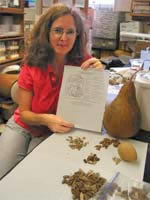
Brenda Wood
Vodouhe came to the U.S. in search of collaborators or other researchers who would be interested in forming a gourd seed exchange program. He grows only pure lines of gourds and would be willing to use species grown in the U.S., providing that they are also pure. While Wood does not work with gourds in her official AY job, she is an avid gourd grower and gourd artist, and member of both the Alabama Gourd Society and American Gourd Society. She has already heard from several growers who grow pure lines and are interested in participating in the gourd seed exchange program.
To learn more about the effort, contact Wood at 334-844-3968 or woodbre@auburn.edu.
Shannon Receives AALGA Grant
Dennis Shannon, professor of agronomy and soils (AY), received an Alabama Agricultural Land-Grant Alliance grant that began Oct. 1. His project is entitled "Development of Medicinal Plants for Alabama's Black Belt." Principal collaborators in addition to Shannon are: Errol Rhoden, Jannette Bartlet and Dennis Anderson of Tuskegee University; Catherine Sabota and Rudy Pacumbaba, Jr., of Alabama A&M University; Norman Doorenbos, a professor of pharmacy at Auburn; and Barbara Kemppainen, a professor in the AU College of Veterinary Medicine.
Poultry Science (POUL)
Don Conner, Head
334-844-4133
www.ag.auburn.edu/poul
New Poultry Science Building Dedicated
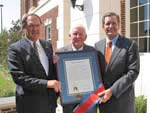
Dean Richard Guthrie, Bob
Brewer and AU Trustee John
Blackwell holding Poultry Science
Building dedication resolution.
Students, faculty, Auburn University (AU) administrators and representatives of Alabama's thriving poultry industry all were on hand recently for the dedication of AU's new 85,000-square-foot Poultry Science Building, located off Lem Morrison Drive on the Auburn campus.
The ceremony, held on Sept. 2, officially opened the doors to the building, which represents an almost $20 million investment and provides laboratories, classrooms, and office space for the more than 20 poultry science department faculty, not to mention staff and graduate students. It also houses faculty in the AU Department of Nutrition and Food Science, representing Auburn's commitment to multidisciplinary programs.
The ceremony included comments from AU Department of Poultry Sciences (PH) Head Don Conner; College of Agriculture Dean and Alabama Agricultural Experiment Station Director Richard Guthrie; Bill Jordan and Gerald Bailey, both with the Alabama Poultry and Egg Association's AU Relations Committee; AU Board of Trustee member John Blackwell; and AU Interim President Ed Richardson.
Conner praised the efforts of his faculty and staff, past and present, as well as those in the AU administration and the state's poultry industry for making this building a reality.
During the event, AU Board of Trustee member John Blackwell presented a resolution from the board officially naming the facility the Poultry Science Building. He then presented a copy of the resolution to retired PH Department Head Robert N. Brewer, who initially spearheaded the effort to build the facility.
Richardson noted that this new facility "makes all of us proud" and noted it is another example of Auburn's commitment to new construction that will serve Êthe state for many years to come.
Auburn Wins at PSA
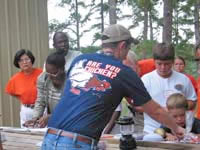
Alumni, friends, faculty and students enjoy
the annual poultry science barbeque,
held on homecoming weekend.
Brigid McCrea, Amy Doernte and Vanessa Kretzschmar-McCluskey, graduate students in the Department of Poultry Science (PH), were honored at the 94th Annual Poultry Science Association Meeting held this past summer in Auburn. These awards recognized their outstanding efforts in conducting research and presenting those results at the meeting. PH Professor Pat Curtis also was honored at the meetings for her work with poultry and egg technology.
McCrea was awarded a Student Certificate of Excellence, Best Presentation, in the Environment and Management Section for “Recovery of Campylobacter jejuni from broiler house samples during four consecutive flocks: Isolate distribution.” PH Professor S. F. (Sarge) Bilgili is her major adviser.
Doernte was awarded a Student Certificate of Excellence, Best Presentation, in the Physiology Section for “Spontaneously occurring fibroid tumors of the laying hen oviduct.” PH Associate Professor Wallace Berry is her major adviser.
Kretzschmar-McCluskey was awarded a Student Certificate of Excellence, Best Presentation, in the Processing and Products Section for "Influence of hen age on shell egg exterior, interior and contents microflora and Salmonella prevalence during a single production cycle." PH Professor Pat Curtis is her major professor.
Curtis was recognized for outstanding contributions to the field of poultry and egg products technology at the meeting.
Her research and extension/outreach programs on poultry and egg safety and quality have generated numerous invited presentations in regional, national and international meetings and multiple book chapters, journal articles, abstracts, trade magazine articles,extension publications and three patents. Her research expertise focuses on applied research on poultry and egg products relating to microbial safety, processing technology, quality control, waste water and water reuse. She has served as chair of the S-292 Multi-State Research Project and has been associate editor for Poultry Science . Other areas of interest include food laws and regulations, plant-employee safety and consumer perceptions of food safety and acceptance of new technologies.
Curtis joined the department in 2002 as professor and the director of the Poultry Products Safety and Quality Peak of Excellence Program. Prior to coming to Auburn she was a faculty member in the Department of Food Science at North Carolina State University and the Department of Animal and Food Science at the University of Wisconsin-River Falls.
Horticulture (HORT)
Charles Gilliam, Chair
334-844-4862
www.ag.auburn.edu/hort
Horticulture Dedicates Thompson Conference Room
A $30,000 donation in honor of an AU ag alumnus and horticulture industry giant has given the Department of Horticulture a new, state-of-the-art conference room and student services center.
Lamar Thompson and Martha Moore of Montgomery-based CCC Associates made the donation to pay tribute to their father, CCC founder James L. Thompson.
“They were looking for a way to honor their father, and they knew he loves Auburn and our students,” horticulture professor Harry Ponder said in dedication ceremonies in September. “This conference room ensures that our young people are well taken care of. This day is a highpoint in the history of the horticulture department at Auburn University.”
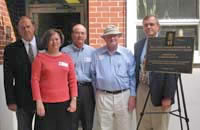
Celebrating the dedication of the
Thompson Horticulture Conference
Room are, from left, CoAg Dean
Richard Guthrie, Martha Thompson
Moore, Lamar Thompson, James L.
Thompson and Horticulture Department
Chair Charles Gilliam.
The new conference room, located in the south corner of the first floor in Funchess Hall, features a multi-media center, motorized screen and ceiling-mounted projector. In addition to meetings and presentations, the conference room and an interview room across from the conference facility already are in heavy use as companies from across the country come to the AU campus to conduct job interviews with horticulture undergraduates.
Ponder, who is the department's job placement and internship program coordinator, also has a new office in the mini-complex.
Thompson earned his ag degree from AU after World War II and first worked as assistant county agent in Coffee County. In 1950, he opened Capital Floral in Montgomery, a business that would become CCC Associates. Today, the privately held international company has production, landscape, retail garden and floral divisions.
Reunion Held at SNA
The Horticulture Department held their annual Southern Nurseryman's Association Reunion Aug. 12 in Atlanta, Ga. More than 100 of our alums, family and friends came by to visit, reminisce and share stories of their successful careers.
Applications Open for Study Abroad Program
Applications are now being accepted for the upcoming England Study Abroad Program in Horticulture. Students can earn up to 13 hours of credit over a seven-week period next summer at Myerscough College near Preston, England. Contact Jeff Sibley ( sibleje@auburn.edu ) for details.
Biosystems Engineering (BSEN)
Steve Taylor, Head
334-844-4180
www.eng.auburn.edu/programs/bsen
BSEN Reaching Out to Educate
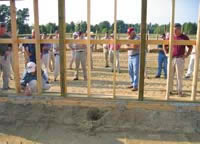
BSEN Professor Jim Donald
(lower left of photo) discusses details
of proper poultry house construction
with some of the attendees at the poultry
house construction short course held for
Tyson Foods in Arkansas.
In mid-August, Department of Biosystems Engineering (BSEN) Professor Jim Donald and Technician Jess Campbell and Agricultural Economics and Rural Sociology Professor Gene Simpson conducted a seminar for Tyson Foods at their World Headquarters in Springdale, Ark.
The seminar was conducted at the request of Tyson Foods to educate their live production managers on economic and engineering considerations for modern poultry housing. Two days of intense classroom training was followed by a one-day field trip. More than 73 percent of Tyson's poultry production capacity was represented by the 60 managers in attendance.The in-the-field session covered basic structural and building technology necessary for meeting high quality construction standards necessary for poultry housing.
BSEN faculty and staff have been busy spreading the word about new developments in precision agriculture and precision forestry techniques and technology. BSEN Assistant Professor John Fulton and Graduate Research Assistant Christian Brodbeck participated in several field days where they discussed the use of both precision agriculture and precision forestry technologies.
Fulton also attended the 27th Annual Southern Conservation Tillage Conference along with other representatives of Auburn's Precision Ag Team. Fulton presented a paper entitled, "An Overview: Merging of Subsurface Drip Irrigation (SDI) and Autoguidance for Cotton Production in Alabama" with coauthors BSEN Assistant Professor Mark Dougherty, Department of Agronomy and Soils Professor Joey Shaw and USDA National Soil Dynamics Lab scientist Randy Raper.
BSEN Head and Professor Steve Taylor presented new developments in precision forestry herbicide application technology at the Forestry Herbicide Update continuing education session for professional herbicide applicators held in Camden in July. More than 120 foresters and herbicide applicators attended the program sponsored by the AU School of Forestry and Wildlife Sciences.
BSEN Going International
Biosystems Engineering (BSEN) Professor Kyung Yoo visited the Republic of Moldova for three weeks in June as a technical volunteer for the Citizen Network for Foreign Affairs (CNFA), which is funded by the U.S. Agency for International Development. He visited three regions of the country to consult on irrigation systems for individual farmers.and to present short courses on irrigation principles and drip irrigation systems.
In August, BSEN head and professor Steve Taylor attended the World Congress of the International Union of Forestry Research Organizations in Brisbane, Australia. During the Congress, he presented a paper entitled "Tactical Precision Forestry: Site-Specific Silvicultural Operations in the Southeast U.S." with coauthors Tim McDonald, John Fulton and Frank Corley.
ASABE Association Drawing New Students
Student members of the newly renamed American Society of Agricultural and Biological Engineers (ASABE) got off to a great start this fall with a larger than usual group of active freshmen and sophomore students bringing new faces to the student branch of ASABE. Students gathered for an ice-breaker evening in early September and held their annual fall cookout at the Tom Corley Building later that month. Several other events, including several industry-student meetings are planned for the coming school year.
BSEN Getting Grants
BSEN Assistant Professor Oladiran Fasina is working with Alabama Cooperative Extension System agents Stan Roark and Chip East to demonstrate a solar energy hot water system for heating Alabama greenhouses in the winter. The project was funded by the Alabama Department of Economic and Community Affairs.
Food engineering programs at Auburn and Tuskegee are getting a significant boost this year from a nearly $300,000 grant awarded by USDA to both institutions. Fasina will be working with Barrett Vaughn of Tuskegee University (TU) to establish a new food engineering laboratory in the Department of Food and Nutritional Sciences at TU in partnership with Auburn, the University of Alabama and two USDA-Agricultural Research Service laboratories.
The Alabama Agricultural Land-Grant Alliance (AALGA) recently awarded two grants to teams of investigators that included BSEN faculty. The project entitled "Innovative on-site wastewater treatment for the Black Belt" has an investigator team of BSEN Assistant Professor Mark Dougherty, and Joey Shaw and Wes Wood, both faculty members in agronomy and soils, David Mays and Teferi Tsegaye from Alabama A&M University and Vaughan. Blackland Prairie soils in central Alabama are unsuitable for conventional on-site sewage disposal due to very low permeability and seasonal high water tables. The researchers are looking for new systems to offer improved on-site treatment of sewage.
A second project funded by AALGA will help plan the development of an irrigation research infrastructure in the Black Belt region of Alabama. The research team includes Dougherty and Fulton, Jeff Sibley from the Department of Horticulture, Donn Rodekohr from agronomy and soils; Tsegaye of Alabama A&M; and Vaughan of TU.
BSEN Teaching Program Growing
BSEN faculty Oladiran Fasina and Steve Taylor received a prestigious National Science Foundation grant to plan new curricula in biological engineering at Auburn University. They will be working with Chris Roberts and Steve Duke, both faculty in AU's Department of Chemical Engineering and James Groccia, the director of Auburn's Biggio Center for Teaching Effectiveness on the one-year project.
Faculty from BSEN and chemical engineering will work together to develop innovative cross-disciplinary curricula in biological engineering. The cross-disciplinary curricula offer many unique opportunities to employ multidisciplinary, team activities for the students.
Service learning programs, named Project Design Studios, similar to those used in Auburn's architectural Rural Studio program, will also be developed to build linkages with economically depressed regions and underrepresented groups.
Entomology and Plant Pathology (ENTM)
Art Appel, Chair
334-844-5006
www.ag.auburn.edu/enpl
Appel Chosen New Department Chair
Art Appel, a professor of entomology, has been elected chair of the Department of Entomology and Plant Pathology (ENTPLP).
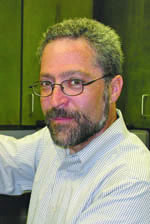
Art Appel
Appel joined the CoAg faculty in 1985 and has concentrated his work on urban entomology, structural pests and insect physiology and behavior. He received his bachelor's degree in biology from the University of California-Los Angeles and his master's and doctorate degrees in urban entomology from University of California-Riverside.
He was elected by the ENTPLP faculty to replace Mike Williams, also a professor of ENTPLP, who has served as chair for the past six years.
Mullen Cited for Research on Mites, Ticks
Thirty-plus years of significant contributions to the study of mites and ticks have earned Auburn University entomologist Gary Mullen recognition from the International Journal of Acarology .
The journal presented Mullen its Acarology Research Award during the publication's 30th anniversary celebration this summer in Columbus, Ohio. The plaque Mullen received reads, "Our science has flourished because of you."
Presenters particularly acknowledged Mullen's research contributions relating to mites and ticks of medical and veterinary importance, including his work with ticks and Lyme disease in Alabama.
In addition to his research program through the Alabama Agricultural Experiment Station, Mullen has taught acarology, or the study of mites and ticks, as part of the AU Department of Entomology's graduate-level curriculum for the past 22 years. He is a charter member and past president of the Acarological Society of America and currently serves as a member of its executive committee.
Along with Mullen, acarologists from Canada, Brazil, Egypt, India, Pakistan and Japan also merited research awards from the journal.
Agricultural Economics and Rural Sociology (AGEC)
Curtis Jolly, Interim Head
334-844-4800
www.ag.auburn.edu/agec
>Jolly Named Outstanding Agricultural Economist
Curtis Jolly, a professor and interim chair of the Department of Agricultural Economics and Rural Sociology (AEC), has been named one of the nation's 10 outstanding black agricultural economists.
The recognition came this summer during the American Agricultural Economics Association's 2005 meeting. Jolly and the nine other honorees were selected based on their outstanding contributions in the areas of teaching, research, extension and administrative duties. The association's Committee on the Opportunities and Status of Blacks in Agricultural Economics presented the awards.
Jolly, who holds a bachelor's degree from Tuskegee University, a master's degree from Auburn University and a doctorate in agricultural economics from Louisiana State University, joined the faculty at AU in 1980. In addition to his roles as teacher and student adviser, Jolly conducts extensive research, primarily in the areas of international trade and the economics of aquaculture.
He also participates in a number of international programs and has worked in more than 15 African and Caribbean countries. He was recently invited by the Centers for Disease Control and Prevention to the World Health Organization in Geneva, Switzerland, as one of 39 international experts to develop a strategy to reduce the economic and health effects of mycotoxin in legumes and grains in Africa and the developing world.
Novak Honored for Outstanding Public Policy Education
James L. Novak, an Alabama Cooperative Extension System economist and professor of AEC, recently was presented with the R.J. Hildreth's Award for Career Achievement in Public Policy Education. The award was given in September at the National Public Policy Education Conference in Washington, D.C.
The award, sponsored by the Farm Foundation and the National Public Policy Education Committee, is presented to "individuals who have demonstrated excellence in scholarship and public service through public policy education programs over their career." Novak continues to write papers, articles and bulletins and conduct education programs on key public policy issues, the most recent of which dealt with the impact of Social Security reform on U.S. farmers. To read more go to http://www.aces.edu/department/extcomm/npa/newsline/archives/001396.php
Animal Sciences
Wayne Greene, Head
334-844-4160
www.ag.auburn.edu/ansc
Bartol Named Barron Lecturer At The University Of Florida
Frank F. Bartol, professor in the Department of Animal Sciences (AS) was recently named the Donald Henry Barron Lecturer for 2005-2006 by the University of Florida Interdisciplinary Reproductive Biology (UF-IRB) Group.
Professor D. H. Barron, after whom the lecture is named, completed a long and distinguished scientific career at Yale University before assuming the J. Wayne Reitz Chair in Reproductive Biology and Medicine at the University of Florida in 1969.
Initiated in 1994, the Barron lectureship is awarded "in recognition of outstanding research and scholarly activities in the field of reproductive biology" and is the highest honor bestowed upon invited speakers by the UF-IRB group.
The lecture delivered by Bartol, entitled "Uterine Development and Endo-metrial Programming," was presented on the University of Florida campus in September.
AS Faculty Tour Alabama Beef Farms
Sometimes it's good to educate the educators. Take, for example, a two-day tour that Department of Animal Sciences (AS) faculty and staff members took this summer to see Alabama's beef industry up close and personal.
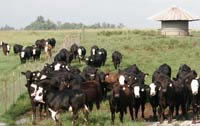
Simmental-Angus herd at a
Clanton area cattle farm.
The tour, hosted and arranged by the Alabama Cattleman's Association, took 12 AS faculty and several AS staff members on a road trip to seven communities to look at cattle farms as well as allied industry sites.
The idea for the tour was not new. According to AS department head Wayne Greene, tours such as this had been conducted years ago in the department. But no such trips had been taken in recent years and Greene, as a new department head, thought reinstituting such a trip would have several advantages.
According to Greene, the trip was a rousing success. "Our faculty got in good discussions with the producers and came back with some specific research project initiatives in mind," he says. The trip may also result in collaborative relationships with other groups to further the AS research program.
Along on the trip were faculty members who were not necessarily directly associated with beef cattle work. Faculty members working with sheep and goat studies, swine and horses attended, which Greene says will help them broaden their perspective on Alabama's animal agriculture issues.
The tour was hosted and planned by the Cattleman's Association and Fuller Supply Company at no cost to the department and included stops in Horton, Cullman, Chilton County, Marion Junction, Lowndesboro, Fort Deposit and Hope Hull. Along the way the AS coalition saw several beef cattle operations, the Black Belt Research and Extension Center's beef research program and also visited a livestock auction in Cullman. In addition, they had many chances to visit one-on-one with producers.
Greene hopes to make the trip an annual event, each time focusing on a different animal industry.
Fisheries and Allied Aquaculture (FISH)
David Rouse, Interim Head
334-844-4786
www.ag.auburn.edu/dept/faa/
FAA Has Strong Presence on the Coast
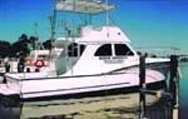
A new 44-foot research vessel, named the RV Mary Lou after FAA staff member Mary Lou Smith, will help with off-shore research.
The Department of Fisheries and Allied Aquacultures (FAA) has greatly expanded its program in the coastal region of Alabama during recent years.
In the spring of 2003, FAA dedicated a new shellfish lab on Dauphin Island to serve as a base of research activities. In the spring of this year, they commissioned a new 44-foot research vessel, named the RV Mary Lou after FAA staff member Mary Lou Smith, to help with off-shore research. Both have been tremendous resources for research and extension activities but they have also given cause for increased stress during such storm events as the recent hurricanes. Fortunately, both the lab and research vessel escaped with little damage during Hurricane Katrina.
New Web Site Offers Water Education Resources
A new Web site, www.alearn.info, has been developed by the Department of Fisheries and Allied Aquacultures (FAA) to provide citizens with useful, timely and interesting information about Alabama's waters and the creatures that live in and on the water. This site provides support for Alabama education in aquatic sciences, aquaculture, recreational fisheries and natural resource conservation.
Alearn.info is a cooperative effort by the Auburn University Department of Fisheries and Allied Aquacultures and the Alabama Cooperative Extension System. Aquaculture producers, students, anglers, teachers and other citizen groups will find information here that will help them conserve, enjoy and gain economic benefit from Alabama's rich aquatic resources.
Black Belt Aquaculture Initiative Under Way
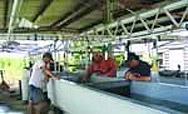
Members of the aquaculture
initiative team visit with a local
grower in the Black Belt.
The Alabama Legislature has allocated a total of $850,000 to the Alabama Agricultural Experiment Station (AAES) and Alabama Cooperative Extension System to support and expand Alabama's aquaculture industry and to provide a catalyst for economic development in west Alabama.
Through this initiative AAES and Extension personnel are working in Alabama's Black Belt to enhance the region's existing catfish industry, enable newcomers—especially small producers—to get into the business, find ways for current producers to maximize their profits and introduce new technologies and aquacultural crops to the region.
To help current catfish producers maximize their profits, research and extension personnel are focusing on ways to increase profit per acre rather than pounds per acre.
AAES and Extension personnel also are facilitating the transfer of new technology to catfish producers. Additional work is also looking at ways to use catfish processing byproducts for value-added products. And, an economic study is under way to determine the impact of the aquaculture industry in west Alabama today and into the future.
In addition to working with the traditional catfish industry, AAES and Extension System personnel are helping producers identify and produce new high-value aquaculture species such as marine fish and baitfish that can be grown in Black Belt ponds. Much of the groundwater in the Black Belt has an elevated salt content, which may be liquid gold for aquacultural producers willing to try new crops.
In the future, research and extension personnel plan to explore new processing and packaging options that will add value to all these aquacultural crops.
AU Center to Develop Aquaculture Industry in Uganda
CoAg’s International Center for Aqua-culture and Aquatic Environments has landed a $2.5 million award to jump-start the commercial fish farming industry in Uganda.
During the 40-month project, funded by the U.S. Agency for International Development, a team of faculty from the Department of Fisheries and Allied Aquacultures (FAA) will establish model cage- and pond-based fish farms in Uganda that are based on high-quality fish feeds and best management practices for viable commercial production of fish, primarily tilapia and the Clarias catfish. These model production systems, to be located on private farms, will serve as demonstration sites for spreading the technologies to others.
“This is a very significant project and will be instrumental in establishing the infrastructure so that an aquaculture industry can grow and thrive in Uganda,” Bill Daniels, a FAA associate professor and campus coordinator of the project, says.
Fish consumption is high and demand is increasing in Uganda, but the vast majority of the supply for both domestic consumption and export is natural catch from the country’s lakes and rivers. With that supply threatened by increased pollution and unsustainable fishing practices, a conversion to fish farming, or aquaculture, is crucial.
A major hurdle to the establishment of an aquaculture industry in Uganda is the lack of local, high-quality fish feed, Daniels says.
“Fish require a top-quality, nutritionally complete and balanced diet to grow rapidly and remain healthy, so local feed production is critical to the overall success and sustainability of an aquaculture industry in Uganda,” Daniels says. “During the first two years of the project, we will be working to facilitate the transfer of feed production technologies, using locally available materials, to local businesses, especially current manufacturers of other animal feed.”
Meanwhile, the project will import soybean-based feeds to demonstrate their value to farmers, he said.
FAA Research Associate Karen Veverica has moved to Uganda and will oversee the project there and serve as chief of party as well as the technical expert on pond construction and management and fish production. Veverica has 25 years’ experience in aquaculture, 15 of those spent full time in Africa. She will be supported by two Ugandan fisheries experts, staff from the Ugandan Fisheries Resources Research Institute and faculty from Makerere University in Kampala, Uganda.
Faculty from the CoAg agricultural economics and rural sociology department also will be involved in the initiative.
